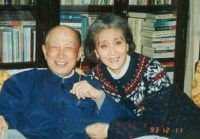Jiang Ying
Jiang Ying (Chinese: 蒋英, Aug. 11, 1919-Feb. 5, 2012) was a prominent Chinese soprano and vocal music educator. However, she was best known as the wife of Qian Xuesen, the guru of China’s astronautic science, dubbed “Father of Chinese Aerospace” and “King of Rocketry.”
Outshone by her husband’s significance and prestige around the country, Jiang had to give up her onstage performance and work behind-the-scenes as an educator after the couple’s return from the United States in the 1950s. She is also cousin to the famous Chinese martial arts fiction writer, Jin Yong.
Born to a mixed, affluent family in Haining, Zhejiang Province, Jiang is the daughter of Kuomintang military strategist Jiang Baili and Japanese mother Satō Yato. Jiang had access to a variety of advanced educations in the Republic of China (1911-1949). Her father did not set strict rules or impose a strong will on his children, so Jiang could freely choose her subjects, which subsequently turn out to be music. She commanded singing and piano performance after being admitted to a private all-girls school in Shanghai, composed of both classical Chinese and western cultures.
In 1937, a year after her European trip with her father, Jiang joined the Berlin Conservatory, now the Berlin University of the Arts. The university courses required her to learn several languages, including German, Italian, French and English to back her vocal training and understanding of numerous musicians in history.
“I was engulfed by a sea of knowledge,” Jiang later recalled. “I swallowed and swallowed, but there are endless precious things that are impossible to be swallowed up.”
Yet her academic years were overshadowed by the looming World War II. What was worse, her father died in 1938 in Yishan, Guangxi, which some historians say was during Kuomintang’s retreat after the Japanese’s mass invasion. Amidst Europe’s raging conflicts, Jiang was unable to return home to mourn her father. Fleeing from Germany to Hungary and then to the neutral state of Switzerland, she continued her music training. In an international music festival held there in 1944, she charmed the audience with her moving voice and oriental figure and hence rose to prominence.
On May 31, 1947, she held her first opera solo concert in Shanghai Lanxin Theater, achieving great success. In the same year, she reunited with her childhood acquaintance Qian. Jiang recollected her time when she was jestingly adopted by Qian’s family when she was 4 years old. She said she was soon bored by the family’s only son, Qian Xuesen, whose attempt to amuse her did not receive her approval.
But their reunion turned out to be much more pleasant. Qian, then 36 years old, had already become the youngest associate professor at the Massachusetts Institute of Technology (MIT). Still single, Qian’s parents expected him to find a wife during his stay in Shanghai. He did not disappoint, and asked for the charming soprano‘s hand to accompany him back to the U.S.
Through 62 years of marriage, the couple survived numerous ups and downs, mostly concerning Qian’s significant role in the field of astronomy. They were confined in the U.S. for five years after Qian reported his leave from MIT to the Pentagon – a move to limit leaks of classified technological information. After their return to China, Qian was rarely home because of his highly confidential research.
Jiang gave up her onstage career for the sake of Qian and became a professor in China’s Central Conservatory of Music. Still, Qian remained highly appreciative of Jiang’s artistic talents, famously saying: “Scientists also needs inspirations, and many of my inspirations came from my perspectives of arts.”

